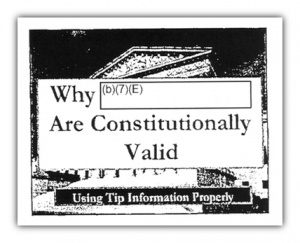US/Freedom of Information Act
| Type | law |
|---|---|
| A now more or less defunct law, widely flouted by many organs of the US government. | |
The Freedom of Information Act (FOIA), 5 U.S.C. § 552, was a federal freedom of information law that allowed for the full or partial disclosure of previously unreleased information and documents controlled by the United States government. The act is still in force, and FOIA requests are still filed and responded to, in US and in other countries where similar legislation exists. The US government itself does not provide easy access to these documents, but thousands of FOIA acquired documents are available at GovernmentAttic.org/.
Contents
History
The Freedom of Information Act was initially introduced as the bill S. 1160 in the 89th Congress. When the two-page bill was signed into law it became Pub.L. 89–487, 80 Stat. 250, enacted July 4, 1966, but had an effective date of one year after the date of enactment, or July 4, 1967. During the period between the enactment of the act and its effective date, Title 5 of the United States Code was enacted into positive law.[1] For reasons Wikipedia describes as "now unclear but which may have had to do with the way the enactment of Title 5 changed how the law being amended was supposed to be cited", the original Freedom of Information Act was replaced. A new act in Pub.L. 90–23, 81 Stat. 54, enacted June 5, 1967 (originally H.R. 5357 in the 90th Congress), repealed the original and put in its place a substantively identical law. This statute was signed on June 5, 1967, and had the same effective date as the original statute: July 4, 1967. Ironically, it was Lyndon Johnson who signed the act into law, in spite of misgivings.
Post 9/11 Decline

After September 11th, 2001, in the face of the routine censorship under the "war on terror" dogma, John Young reports increasing stonewalling by US government officials and these days almost no information of value is forthcoming. He said in 2013 that he makes only about 1 FOIA request per year and that he thinks that "the FOIA system should be closed as a money-wasting fraud."
Dallas Occupy Plot
A rare post 9-11 success for a FOIA request was the partial revelation of the Dallas occupy plot. A request by Jason Leopold to the FBI and DOHS turned up documents which were used by Ryan Shapiro, an MIT graduate student, to filed several more specific FOIA requests in 2013. In response, the FBI said they had no relevant records, so Shapiro sued, accusing the bureau of an inadequate search. The FBI then reported 17 pages of relevant records, and released 5 heavily-redacted pages, enough to deduce the existence of a plot to use snipers to assassinate leaders of the Dallas Occupy movement. Shapiro sued again, demanding access to all pages, and a federal judge ordered the FBI to explain why information was withheld. Notwithstanding an earlier denial of any engagement with law enforcement, the FBI then claimed that release of documents would interfere with ongoing law enforcement proceedings and/or privacy of law enforcement personnel. A judge approved these reasons for non disclosure in February 2015[2]
Drug Enforcement Agency
The US DEA has more than doubled its rate of denials of FOIA requests under US President Barack Obama.[3] See the example on the right to grasp the kind of denials now routine in 2014; the DEA redacted the name of a method its trainers and legal auditors deemed not only constitutional but also palatable to the public. This shielded tactic is “tips and leads paradigm” that is the "primary methodology for protecting [intelligence community] information that is shared with [law enforcement agencies]." The DEA scrubbed all mention of this method throughout the entire document release by claiming FOIA exemption b(7)E, which protects law enforcement techniques from disclosure. Redactions extended even to a separate presentation devoted to the constitutionality of this method.[4]
In 2014 U.S. District Court Judge William Zloch questioned the FBI's failure to produce court documents requested under the Freedom of Information Act in the matter of 9/11, noting that the FBI had
- Provided records with "apparent" and unexplained chronological "gaps."
- Presented to the court "located documents" that "seem incomplete."
- Submitted "summary documents" that "do in fact seem to contradict each other."[5]
UK FOI legislation
Similar legislation was enacted by the UK Parliament on 30 November 2000. [6] Similarly to the US situation, the legislation does not appear to be very functional as regards matters of deep political importance, and some requests are left in limbo.[7]
References
- ↑ The enactment of Title 5 into positive law was done by Pub.L. 89–554, 80 Stat. 378, enacted September 6, 1966. This means that while Title 5 existed before, it was merely a compilation of laws but not the law itself. Only about half of the U.S. Code is positive law, meaning the law itself. See [1] for background on positive law codifiation of the U.S. Code.
- ↑ http://www.chron.com/houston/article/Occupy-Houston-assassination-plot-records-won-t-6071015.php
- ↑ http://www.salon.com/2014/08/21/the_u_s_governments_creeping_war_on_journalists_partner/
- ↑ https://www.muckrock.com/news/archives/2014/feb/04/method-so-acceptable-dea-cant-even-tell-you-its-na/
- ↑ http://www.heraldtribune.com/article/20140408/OPINION/304089997?tc=ar
- ↑ Freedom of Information Act 2000 - Wikipedia page
- ↑ https://www.whatdotheyknow.com/request/1987_decision_not_to_prosecute_a
